by [email protected] | Aug 25, 2021 | Prescriptions for your Practice
Podcast: Play in new window | Download
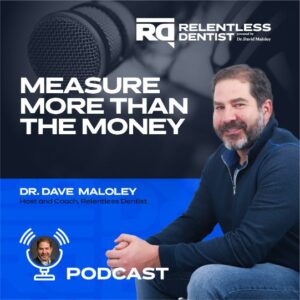
“Not everything that can be counted counts, and not everything that counts can be counted.” — Albert Einstein
Money is necessary to put up and run a practice — we can’t argue with that. But, it is not the be-all and end-all. The money supports our basic needs, goals, and security, but it cannot create a purpose in and of itself — and that’s what I want to talk about today.
In this episode, I will share with you things that are not necessarily money-centered but can provide a significant impact on your business and even drive profits. These key indicators that aren’t focused on a dollar figure but are profit-magnets will keep you, and your staff performs at their best.
Tune in and find solutions to common practice issues at Prescriptions for Your Practice.
Key Quotes:
- “If we treat money as a math game, we lose track of what really drives profits.”
- “If a business is human-centered, you can have all of the profits that you want. But if a business is profit-centered, then you’ll end up invariably taking advantage of people.”
- “Trust, enthusiasm, and value are all emotional events. And employees’ morale and motivation drive productivity. Your energy and focus and stack of skills drive business growth.”
- “A bad day for you can turn into a rut, and a rut can turn into a pit.”
- “You can’t expect your team to be enthusiastic about their job if you’re checked out. The tone is set at the top.”
- “You should be mindful about what you’re putting into your eyes and your ears.”
- “The key components of a strong culture are safety, hope, optimism, resiliency, and efficacy.”
- “What keeps you enthusiastic will keep you productive.”
- “Referrals are the most viable thing in your business.”
- “Case acceptance starts at the moment somebody hears about you.”
- “A strong referral system can double or triple your marketing return on investment.”
Featured on the Show:
- I appreciate your feedback. Let me know what you learned and loved here: [email protected].


by [email protected] | Aug 18, 2021 | Prescriptions for your Practice
Podcast: Play in new window | Download
 Ok, sit down and hold your horses (or cup?); I’m not suggesting that you commit a crime (pretty far from that). But, while I had your attention, let’s talk about Starbucks. Did you ever wonder how Starbucks redefined the coffee experience? Can you provide a similar experience in your dental practice?
Ok, sit down and hold your horses (or cup?); I’m not suggesting that you commit a crime (pretty far from that). But, while I had your attention, let’s talk about Starbucks. Did you ever wonder how Starbucks redefined the coffee experience? Can you provide a similar experience in your dental practice?
Starbucks has brought in disruptive innovation. It was so phenomenal that it created a niche market and cult following — and of course, competitors. Yet, despite the competition, it has remained steadfast and continues to expand immensely, offering the same consistent products and services wherever you are in the world.
This episode will talk about valuable lessons that you can “steal” from Starbucks to create a patient experience that you will be proud of. I’ll also share tips on finding good team members and keeping them away from the prying eyes of your competitors. So relax, listen to my podcast while enjoying a cup.
Tune in and find solutions to common practice issues at Prescriptions for Your Practice.
Key Quotes:
- “Competition is no longer the dentist down the street. It’s anyone who employs good people.”
- “You have to provide an employer brand that gives these people who want good jobs the upside.”
- “We should go into our day-to-day as a student or as a consultant.”
- “Your top customers are the people on your payroll.”
- “Highly compassionate, highly motivated, hungry, humble, and smart employees want to create their own personalized experience for the patients that walk in your door.”
- “One goal for you and your team is to make sure that every patient feels like the only patient on the schedule.”
- “Your number one job is to make sure that everyone on the team sees the vision, mission, and values as the boss.”
- “Make sure everything is congruent and consistent in your practice with the identity you want out in the marketplace.”
- “The customer isn’t always right.”
- “Good team members are really hard to replace. So make sure that you’re pouring into your team members and you understand that if you treat them as a level 10, they’ll treat your patient as a level 10.”
- “You’ll find that most of the big insights you get, the big wins you get in dentistry, you take from other industries.”
- “Most people are not willing to do what you’re willing to do, and that’s the ultimate competitive advantage — is to create unique value in your communities.”
Featured on the Show:


by [email protected] | Aug 11, 2021 | Prescriptions for your Practice
Podcast: Play in new window | Download
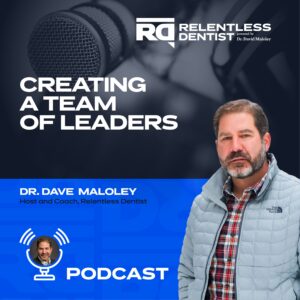
What does it mean to create a team of leaders?
We all know that great leaders don’t create more followers but inspire followers to become leaders. As practice owners, we aspire to have a self-managing team to achieve this goal. Unfortunately, however, it is pretty standard in the dental practice that staff functions based solely on the dentist’s command. Therefore, it defaults to an extra layer of policy and bureaucracy, creating a toxic environment for the staff, the owner, and even the patients.
In this episode, I will talk about autonomy. A unit that’s heavily reliant on command and compliance is a recipe for distrust and disengagement, and it’s essential to address this issue head-on to establish autonomy among members. Also, I will share with you the six tenets that will help your team manage themselves better. Because in a self-sufficient environment, individuals function autonomously, and their accomplishments contribute to the team’s overall growth and success.
Tune in and find solutions to common practice issues at Prescriptions for Your Practice.
Key Quotes:
- “We typically believe that a self-managing team is either a fantasy or we believe that we need a team of all-stars to pull it off.”
- “We can train good help by leading everyone to break old patterns, old unproductive behaviors that they learned and turn them into highly productive autonomous habits.”
- “My practice is not limited by its opportunities but it’s limited by its leader.”
- “Leaders don’t create followers. Leaders create leaders.”
- “You need to set the expectation that you’re gonna give all the tools and training that they need to succeed in their job.”
- “Everyone has to leave their ego at the door.”
- “Be open. Train the team to be receptive to new ideas and to seek out ways to do their job better.”
- “Make sure that growth is the expectation by helping them to find their next mastery level in their job.”
- “Ensure that every team member is better after they work for you.”
Featured on the Show:


by [email protected] | Aug 4, 2021 | Prescriptions for your Practice, Uncategorized
Podcast: Play in new window | Download
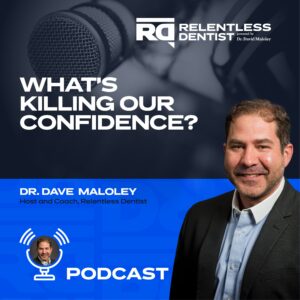
A confident team is a by-product of a confident leader.
Trust is one of the core values of a coherent team. A leader that exhibits confidence is easier to trust, and team members generally feel positive around leaders who exude confidence. I struggled with my confidence early in my practice, and it took a toll on me, my team, and my patients.
In this episode, I’ll walk you through the seven things that we inadvertently do to kill our confidence and how to turn these killers into winners. Also, I will talk about how prioritizing our confidence can significantly impact our psyche, our body, our relationships, and our income. Focusing on our confidence will help us foster a more confident team, more trusting patients, and a successful practice that we can be proud of.
Tune in and find solutions to common practice issues at Prescriptions for Your Practice.
Key Quotes:
- “A confident business with a great reputation, and great numbers come as a by-product of patients being confident in our services.”
- “All businesses take on the personality of its leader.”
- “We should put our own confidence first because that will lead to more loyal, more high-performing team members, more confident patients, and a thriving practice that we can be proud of.”
- “Confidence is the feeling of whatever happens today we’re gonna handle it, and handle it well.”
- “When you make your first maneuver a reactive maneuver, it sets the tone for the rest of the day.”
- “Make sure that you diligently stacking habits that make deposits into your mind, body, and spirit.”
- “There’s a reason you went into dentistry. You have to remind yourself of that meaning.”
- “Book in some time to just unplug. You deserve that and your team deserves that.”
- “The fortune that comes from your practice is gonna come from the expansion of your energy and your impact.”
Featured on the Show:


by [email protected] | Jul 28, 2021 | Prescriptions for your Practice
Podcast: Play in new window | Download
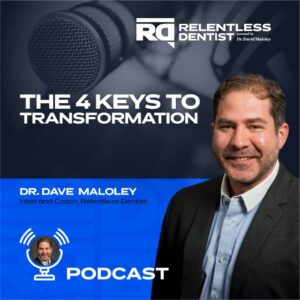 “If come from inside you, always right one.” Mister Miyagi
“If come from inside you, always right one.” Mister Miyagi
At what level are you in your transformational leadership journey?
- Idealized influence
- Individualized consideration
- Inspirational motivation
- Intellectual stimulation
Transformational leadership is a process and a complex one at that. It involves not just you but is composed of interconnected cogs that dynamically work in synchrony and harmony. Your role, as the leader, is to keep it well oiled to run smoothly and accomplish its objectives.
In this episode, I will talk about the process of transitioning from transactional leader to transformational leader, why it gives you a competitive advantage in the new economy, and how to build a framework with a powerful mission, vision, and values that will be your organization’s stronghold.
Tune in and find solutions to common practice issues at Prescriptions for Your Practice.
Key Quotes:
- “I’m really a testament to how important your tribe is. Who’s there to support when you’re going through difficult times, who’s there to challenge you when times were really good.
- “There’s a time and a place for transactional leadership even if you’re a transformational leader.”
- “All doctors that I talk to want to be transformational leaders. They just don’t know how.”
- “Transformational leaders look at their followers and trying to get them to be leaders. They’re not trying to create more followers but more leaders.”
- “You look at teach team members as superheroes and tap into each of their superpowers.”
- “You need a framework of a strong mission, a strong vision, a strong values, to refer to again and again, and again, and you perpetually selling that vision.”
- “Everyone needs to be always growing. Because if they plateau, the business will plateau.”
Featured on the Show:


by [email protected] | Jul 21, 2021 | Prescriptions for your Practice
Podcast: Play in new window | Download
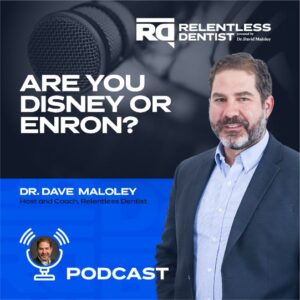 “Every leader is telling a story about what he or she values.” — Vision and Values, Disney Institute
“Every leader is telling a story about what he or she values.” — Vision and Values, Disney Institute
Whether big or small, any organization has an established mission and vision to define its objectives and approach to reach its goal. However, the most crucial aspect of building an organization is the founding principles for which they stand.
Core values are what bind the company, its employees, and the people they wish to serve. It may be uncommon in dental practice, but having a solid foundation of fundamental principles that integrates naturally with the personal values of everyone in the team is crucial to the practice’s growth and success.
In today’s episode, I will discuss why core values are among the bare essentials in an organization, how it helps in the hiring process and performance evaluation, and how it can serve as your “constitution” when facing adversity or challenging decisions. Drafting well-crafted core values are one thing, but having your team enrolled and aligned to these guiding principles and put them in practice rests in the hands of a moral leader.
Tune in and find solutions to common practice issues at Prescriptions for Your Practice.
Key Quotes:
- “We as dentists wanna have core values so that we know what we stand for. And knowing what we stand for is critical for your confidence as a leader and a business owner.”
- “You can use core values to get underperforms on board or out of your way.”
- “You can use core values to help accelerate the growth of your top performers.”
- “It’s not so important what the core values are but that you have core values and you bring them to life.”
- “If you have a smaller practice, this can be a whole meeting wherein the team members bring on their own personal values to the table. If they build the core values with you, they will back it.”
- “Walt Disney really left a legacy through core values that now is this big and powerful company, the size and capacity of an Enron, but in an alignment with core values.”
Featured on the Show:






 Ok, sit down and hold your horses (or cup?); I’m not suggesting that you commit a crime (pretty far from that). But, while I had your attention, let’s talk about Starbucks. Did you ever wonder how Starbucks redefined the coffee experience? Can you provide a similar experience in your dental practice?
Ok, sit down and hold your horses (or cup?); I’m not suggesting that you commit a crime (pretty far from that). But, while I had your attention, let’s talk about Starbucks. Did you ever wonder how Starbucks redefined the coffee experience? Can you provide a similar experience in your dental practice?

 “If come from inside you, always right one.” Mister Miyagi
“If come from inside you, always right one.” Mister Miyagi “Every leader is telling a story about what he or she values.” — Vision and Values, Disney Institute
“Every leader is telling a story about what he or she values.” — Vision and Values, Disney Institute